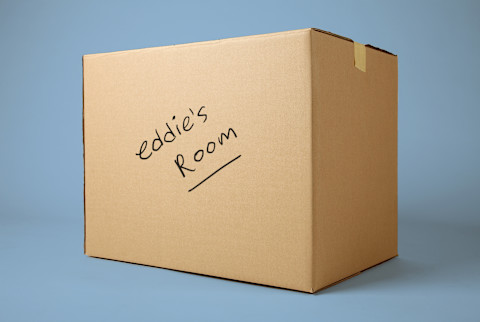Read An Excerpt From "Dear Edward," One Of Our Top Novel Picks For 2020 So Far

He's been in the hospital for a week. A woman on crutches enters the room; she's the head of public relations for the Denver hospital and has been appointed to update the family on everything that's not directly medical.
"Susan," John Curtis says in greeting. He's a tall, bearded man, with the pallor and potbelly befitting a person who spends most of his life in front of a computer screen.
"Has he spoken today?"
Lacey—pale, with a coffee stain on her blouse—shakes her head. "Not since we told him."
"Have you decided if you'd like us to refer to him as Eddie or Edward?" Susan asks.
John turns to his wife, and they share a look. The look—haggard and thready—suggests that they have not slept for more than an hour at a stretch since receiving the phone call. The plane had crashed in the middle of a week when Lacey and John were not speaking to each other because she wanted to move on with their quest to have a baby and he did not. And now the fight and the silence feel irrelevant. They have been bucked off the horse that was their life. Their nephew is lying in front of them, broken, and he is their responsibility.
"This is for strangers, right?" Lacey says. "They don't know him, or us. The press should use his given name. Edward."
"Not Eddie," John says. "Fine," Susan says.
Edward—for that's his name now—is sleeping, or pretending to sleep. The three adults look at him, as if for the first time. The bandage circles his forehead; thick moppish hair slips out beneath it. He has sheer white skin and dark circles beneath his eyes. He's lost weight and appears younger than 12. There's purple bruising on his chest that flowers beyond the neckline of the loose hospital gown. Both of his legs are in casts, but his right one is raised in traction. His feet are covered in orange socks, bought in the hospital gift shop. White letters spell Denver!!! on the soles.
There is a soft stuffed elephant beneath Edward's arm that Lacey finds difficult to look at. The moving company hired to transport the Adler family's belongings across the country stopped at a motel in Omaha the night after the crash. They emptied the truck in the parking lot, pulled every single box onto the asphalt. They opened the one that read eddie's room. They fished the stuffed elephant out of the box and mailed it to the Denver hospital with a note that said: We thought the boy might want this.

They fished the stuffed elephant out of the box and mailed it to the Denver hospital with a note that said: 'We thought the boy might want this.'
Susan says, "The plan is still to airlift him in two days, now that he's stable. A private plane has been donated for the trip, so you can both ride with him."
"Everyone is being so kind!" Lacey says, and then blushes. She has so many freckles that the blush simply serves to join them together. She has taken to wringing her freckled hands, as if the repeated motion might somehow change this unacceptable reality.
"A few other things," Susan says. She leans into her crutches. "Have you been online?"
"No," John says. "Not really."
"Well, just so you know, several Facebook pages have sprung up, devoted to either the flight or to Edward. There was also a Twitter account called @miracleboy, with Edward's face as the avatar, but that's been taken down."
John and Lacey blink at her.
"The content is mostly positive," Susan says. "Condolences, sympathy notes, that kind of thing. You've both been in the news some because people were curious about who was taking Edward in. I just didn't want you to be surprised if you happened upon it."
"Mostly positive?" Lacey says. "Trolls," John says.
"Trolls?" Lacey's eyes look impossibly wide.
"People who write provocative comments online, to try to get an emotional response," John says. "Their goal is to upset people. The more people they upset, the more successful their trolling is."
Lacey wrinkles her nose.
"It's considered an art form by some," John says.
Susan gives an almost inaudible sigh. "In case we don't have another chance to talk properly before you leave, I wanted to remind you about the personal-injury and aviation lawyers. They're going to land on you like vultures, I'm afraid. But they're not allowed to approach you until 45 days after the crash. So please disregard, or sue, anyone who does. You know all the medical bills are being covered by the airline. There's no rush to settle. You'll get Social Security death benefits first, then life insurance money, if either of Edward's parents had a policy. It will take time to sort out the rest, and I don't want you to let anyone convince you that any kind of legal action is urgent."
"OK," Lacey says, but it's clear that she's not paying attention. The TV in the corner is on mute, but the bottom of the screen runs a banner reading, "Miracle boy being released to hospital near relatives' home."
"People can be terrible," Susan says.
Edward shifts on the bed. He turns his head, exposing a smooth, bruised cheek.
"There are family members," she continues, "from the other passengers on the plane who wanted to see Edward, but we kept them away."
"Jesus," John says. "Why do they want to see him?"
Susan shrugs. "Maybe because Edward was the last one to see their loved ones alive."
John makes a small noise in his throat.
"I'm sorry," Susan says, her cheeks pinkening. "I should have phrased that differently."
Lacey sits down in one of the chairs next to the window. A beam of sunlight creates a halo effect around her exhausted face. "One more thing," Susan says. "The president is going to call."
"The president?"
"The president. Of the United States."
John laughs, a quick burst into the particular air of this room. Charged air. Air that is waiting for the next word from the boy on the bed. Air that shushes everyone who enters, separating those who have lost from those who haven't.
Lacey puts her hands to her unwashed hair and John says, "He'll be on the phone, Lace. He won't be able to see you."

Dear Edward is available now.
